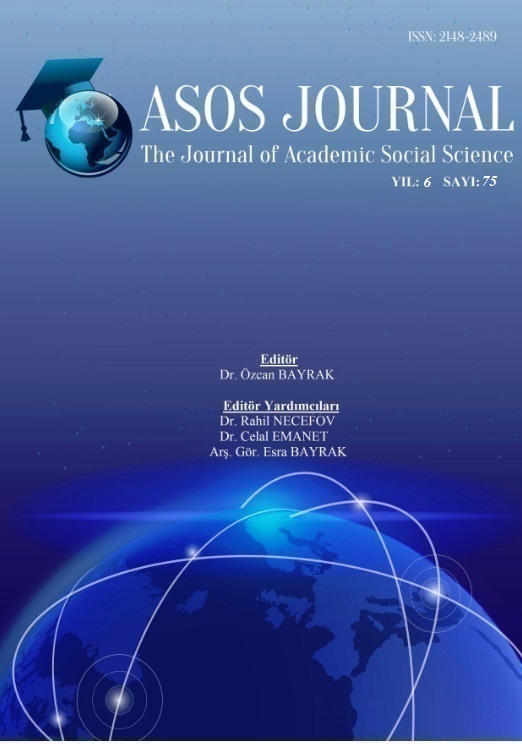Author :
Abstract
‘Diller için Avrupa Ortak Öneriler Çerçevesinde’ yer alan, öğretmenin, dili öğrenenin ve medyanın ilgili rolünün (CEFR, 2013:144), Türkçe öğrenimi ve öğretimi süreci üzerindeki yansımasını yabancı öğrencilerin bakış açısı ile belirlemek amaçlanmaktadır. Araştırmada, ‘nitel araştırma yöntemi’ kullanılmıştır. Nitel araştırma desenlerinden biri olan ‘olgubilim’ tercih edilmiştir. Araştırmanın çalışma grubunu, 2017-2018 Akademik Yılı Güz Döneminde İstanbul Üniversitesi DİLMER Tophane Şubesi’nde B1 kurunda Türkçe öğrenen 19 yabancı öğrenci oluşturmaktadır. Araştırmanın verileri, ‘yapılandırılmış görüşme formu’ ile elde edilmiştir. Araştırmanın verileri; kod, kategori ve tema boyutunda incelenmiş, bulgular bölümünde, temalar hâlinde sınıflandırılarak yorumlanmıştır. Araştırmanın sonucunda, yabancı öğrencilere göre; ders saati, ‘metne yönelik sorular, devamında ortaya çıkan sorular ve test soruları arasında ayrım yapılarak bütün sınıfa ayrılan soru-yanıt kısmı (%95)’ etkinliklerine ayrılmalıdır. Yabancı öğrencilere göre okutmanlarda bulunması gereken en önemli özellik ve yetenek ‘okutmanın didaktik yeteneğidir (%58)’. Ayrıca okutmanlar; bireysel, ikili ya da grup çalışmalarında, ‘dil öğrenenlerin kendi kendine öğrenmeye ilişkin görüşlerini değerlendiren ve bu konuyu yorumlayan bir gözlemci ya da yardımcı rolünü üstlenmeli; ayrıca kontrol ve danışmanlığın yanı sıra, dil öğrenenlerin etkinliklerini de koordine etmelidir (%53)’. Yabancı öğrencilere göre kendilerinden beklenilen ve istenilen; ‘öğretmen ve diğer dil öğrenenlerle öğrenme hedefleri ve yöntemleri konusunda anlaşmaları ve uzlaşmaları, akran çalışması ve değerlendirmesine katılmaları ve bu şekilde gittikçe bağımsızlaşarak etkin bir şekilde öğrenme sürecine katılmalarıdır (%79).’ Yabancı öğrencilere göre çağdaş medyanın modern araçları (CD, DVD, bilgisayar vb.) ‘sınıftaki bütün sunum ve alıştırmalar için (%47)’ kullanılmalıdır.
Keywords
Abstract
This study aims to identify the reflection of the role of lecturers, those learning the language and media based on the framework of ‘European Common Suggestions for Languages (CEFR, 2013:144) on Turkish teaching and learning processes according to the perspectives of foreign students. This study uses ‘qualitative research method.’ This study prefers ‘phenomenology’ which is one of the qualitative research patterns. The study group consists of 19 foreign students learning at B1 level Turkish in Tophane Branch of Istanbul University DILMER in 2017-2018 Academic Year Fall Semester. The data of the study is obtained via ‘structured interview form.’ The data of the study is investigated in the form of codes, categories and themes, classified into themes in the findings section and then interpreted. According to the results of this study, the course hour should involve activities of ‘question-answer session for the whole class by making a distinction between questions for the text, questions emerged afterwards and test questions (95%)’ according to foreign students. The key specialty and talent that a lecturer must have according to students is ‘the didactic talent’ (58%). Moreover, lecturers ‘should assume the role of an observer or an assistant that evaluates and interprets the views of those learning a language about learning by themselves; and should coordinate the efficiency of those learning a language in addition to having the talents of controlling and counseling (53%)’ in individual, double or group studies. According to foreign students, the expectations and demands from them are ‘to agree and come to terms with the lecturer and those learning a language in learning targets and methods, to participate via peer work and evaluation, and thus to become more independent and participate in the learning process (79%).’ According to foreign students, modern tools of contemporary media (CDs, DVDs, computers, etc.) should be used ‘for all presentations and exercises in the classroom (47%).’





